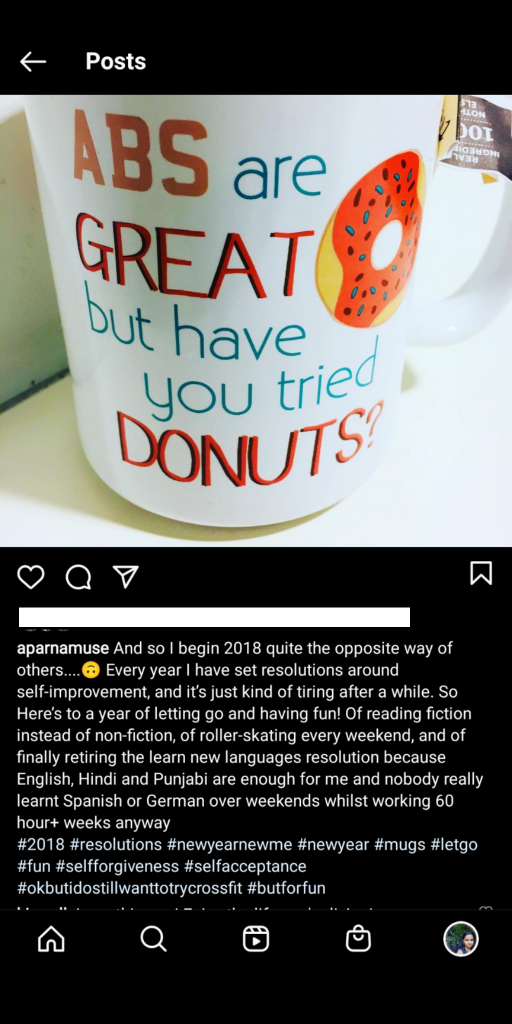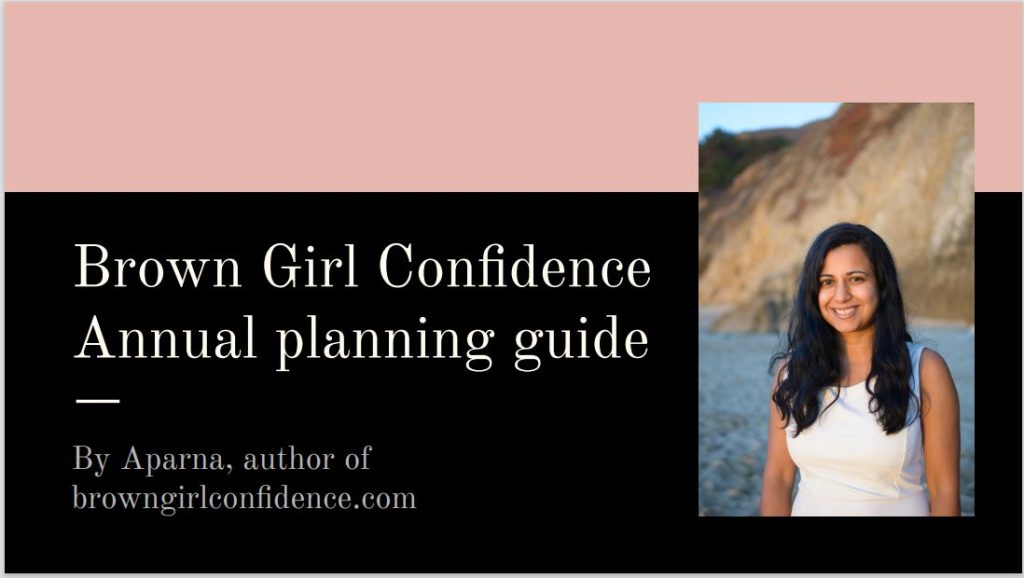Back in 2018, I posted this on my Instagram (@aparnamuse) about not setting any New Year resolutions:

It was a feel-good message to the world, but to be honest, I didn’t feel very satisfied at the end of the year when I couldn’t articulate what I’d achieved, eating donuts and all! I’m sure I had a ton of personal growth – each year of my 20s has felt like a steep learning curve. But not being able to articulate specific progress diminishes some of the pleasure – quite simply, you don’t know what to celebrate other than another revolution around the sun.
Since 2019, I got back to my philosophy of living an “intentional life” and embarked on an annual goal-setting exercise. I have been thrilled with results since then! To give you some examples: In 2019, goals included: Sign up for a Hello Fresh subscription; Go on one exotic holiday; Get promoted at work, Complete Improv course 2 etc. In 2020 goals included: Be comfortable putting together healthy meals yourself; Be more face confident – do video calls (Covid really helped with this one!); Move in with my partner; Find one older female mentor; Complete Improv course 3, and many more.
What is an intentional life?
It’s a way of living with intent, such that you do things with a purpose in mind and take greater control of the elements of your life that you can control. For me, an intentional life is important because I believe that my time on earth is precious. To spend the uncertain and limited time just following the randomness of events that happen to me would feel like a waste — how many exciting opportunities just land in your lap without you trying? An intentional life has these elements:
- There is a purpose and meaning to the actions I pursue — goals are tied to a bigger picture “goal area”. I use an 8-part framework of “goal areas” to structure and ideate my goals, e.g. goals like exercising 4x a week are tied to the overall goal of having the best health possible
- Each year builds upon the previous – it takes practice to get good at something, and switching gears every year doesn’t help you accumulate that practice e.g. you’ll notice the Improv and cooking themes that I built upon from 2019 to 2020 above
- The goals are made as easy-to-implement as possible following the SMART methodology (i.e. goals are Specific, Measurable, Attainable, Relevant, Time-bound)
For all the people who are against the “Intentional life” concept or are appalled at me for treating my life like a business, at least some of them may be against it because they love spontaneity or think this exercise is stressful. A few thoughts:
- Living with intention is not the same as decrying spontaneity. Here’s what I don’t mean by an “intentional life”: a scripted life, a narrow-minded life, a meticulously planned life or a I won’t-leave-any-room-to-react life. Of course, the nature of life is “sh*t happens”, and sh*t will happen, and I will have to deal with unexpected sh*t. But uncertainty doesn’t mean you don’t make any plan at all.
- Your planning exercise is yours: you can plan at the level of specificity that feels comfortable for you. I have a friend who has a meal plan for each day of the week, and I don’t know what I’m having for the next meal at all. Different levels of planning for different personalities! It’s your life – if you don’t want to do any planning at all, that’s also your choice and I respect that. This blog post is for those people who see some value in planning.
- It is work to plan. But who ever said good things come easy? And it’s also pretty stressful if you have a realization years into the future that you “wasted” the past few or several years. So why not do some of the thinking upfront even if only as a regret minimization exercise?
- Don’t intend goals to be punitive: I don’t beat myself for missing something if I really tried, or if the informational context during the year changed and made the goal less relevant. The point of goals is to be motivational
- Define and evaluate goals based on what you can control e.g. if you don’t have a partner currently, putting “Get married” on an annual goal list is a bad idea. Better to note that marriage is a part of your overall life vision, and this year the goal you can set is something that furthers you towards that objective like “Spend at least 1 hour on Bumble every weekend”. There’s a lot of nuance and personal preference to goal-setting so I won’t be too prescriptive but note that there are some things that are in your control (like setting up an online dating account) and some are not (like who you end up meeting, which is largely luck).
Brown Girl Confidence Annual Planning guide – receive it from the Stay Updated page!
I have good news for you! As we head into 2021, my subscribers will get the framework I use for my annual planning as a thank you for helping me build my readership and following. Go to the Stay Updated page and enter your email address to download my guide from your welcome email. Rest assured, you won’t get any spam from me – only an email notification when I publish a blog post, and fabulous subscriber-only content like this guide!
One of my life-goals is to write a book with my learnings, especially from the angle of a woman of color. You don’t have to be a woman of color to sign up for this website though – my writings contain broadly relevant insights that are helpful for anyone. I just write with more nuance tailored for women of color because we are so under-represented in original content creation.
Happy 2021 everyone! We made it through 2020 🙂
